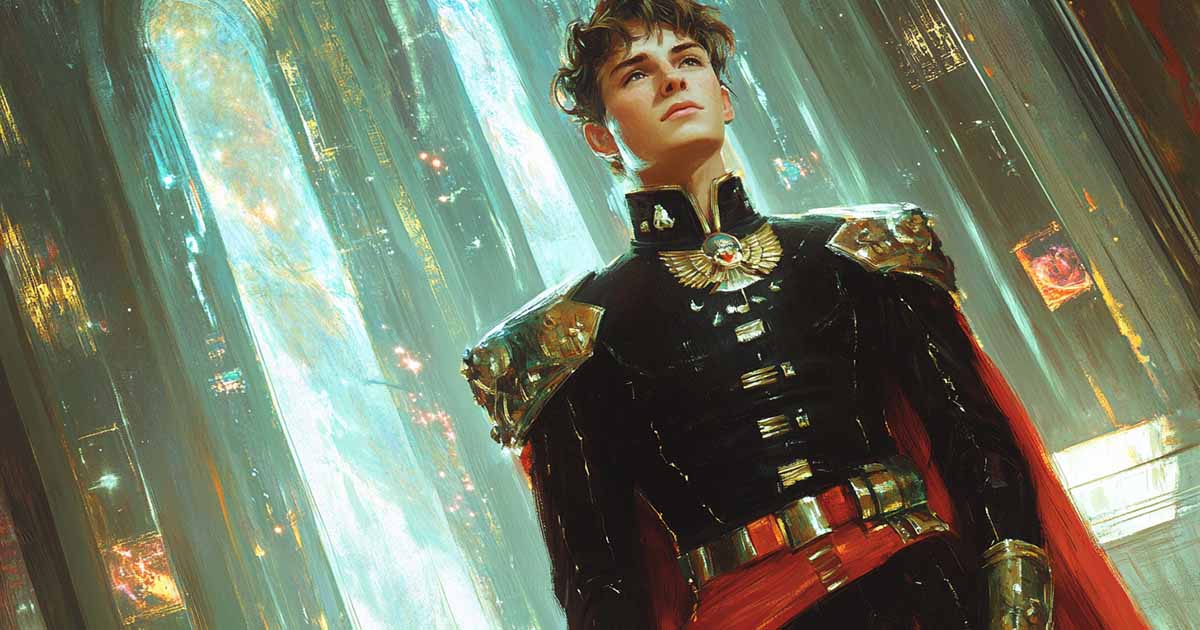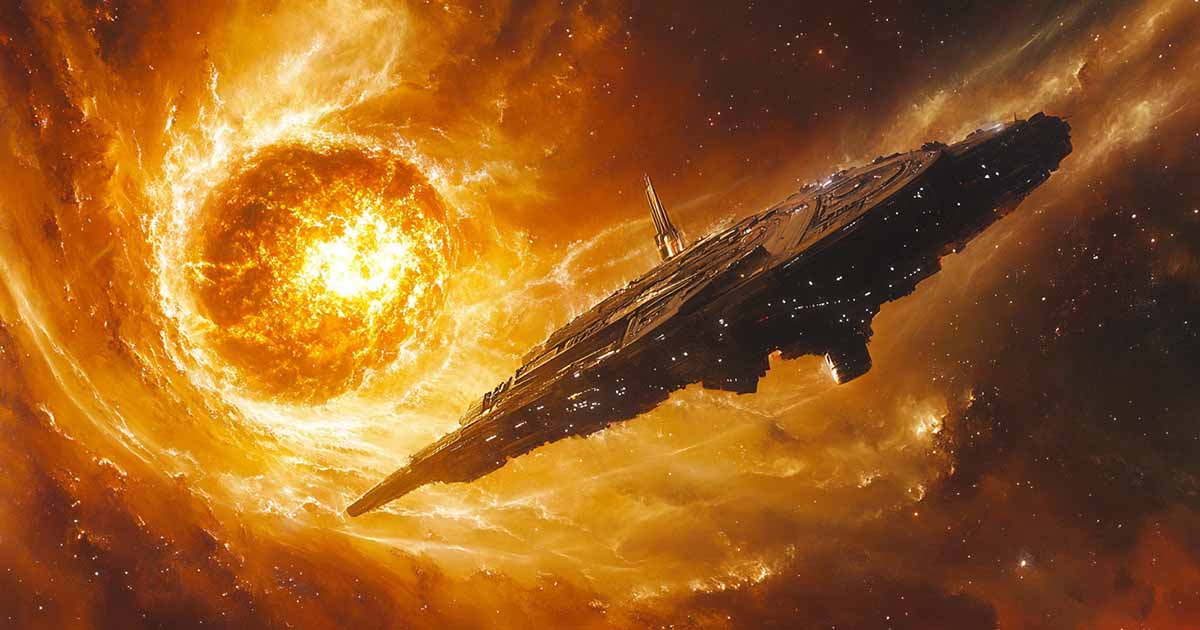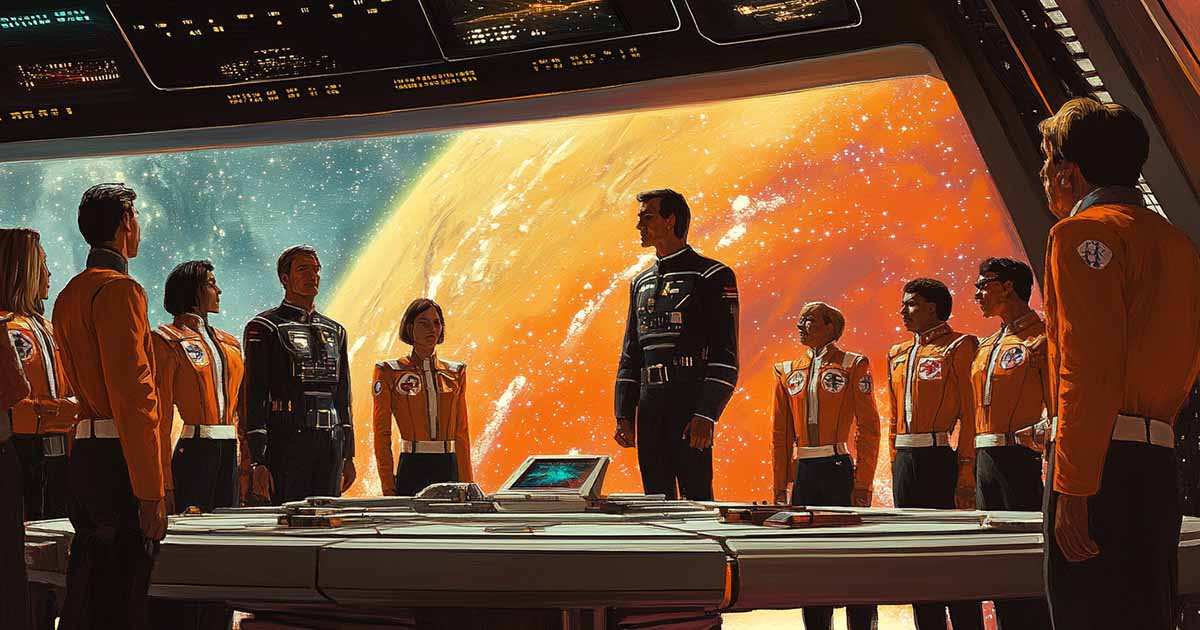Captain Lorq Von Ray Seeks the Impossible
Captain Lorq Von Ray dares to fly into a nova to reshape the future. His vision, courage, and grit show what it means to defy limits and reach for the impossible in classic science fiction.

The Man Who Aimed at a Star
Samuel R. Delany's 1968 novel, "Nova," unfolds in a stratified galaxy where merchant aristocracies dominate from gilded thrones, while frontier systems struggle for autonomy. The galaxy is rich with commerce, technology, and tension, yet its most valuable resource is Illyrion, a powerful substance harvested from the death throes of stars. In this universe of calculated power and entrenched privilege, one man chooses to chase a different destiny. That man is Captain Lorq Von Ray.
Though born into one of the wealthiest families in the Draco system, Lorq rejects a life of comfort and convention. He is driven not by wealth, but by an unshakable urge to do what no one else dares. His plan: pilot a ship into a nova and come back alive with the prize. It is a mission most call impossible.
Yet in classic science fiction fashion, Lorq's courage speaks to a timeless ideal. He is a man reaching beyond limits to change everything.
The Noble Lineage and Bold Imagination
Captain Lorq Von Ray is no ordinary adventurer. He is the son of the Von Ray family, a powerful commercial dynasty that helped build the economic backbone of the galaxy's outer planets. In a universe ruled as much by bloodlines as by balance sheets, Lorq's name commands attention wherever he goes. Yet he carries his inheritance like a burden rather than a crown.

He grew up among the wealthiest men in the Draco system, but he never sought their approval. He understood from an early age that real power came not from status but from action. Where others schemed from boardrooms and salons, Lorq looked to the stars. His imagination was not limited to trade routes and profits.
Instead of consolidating his family's empire, Lorq chooses to pursue a dream many dismiss as madness. He envisions a mission so daring, so unprecedented, that even his enemies stop to watch. His goal is to reach the heart of a dying star—a nova—and retrieve Illyrion at the moment of its explosive birth. It is a plan that blends scientific ambition with poetic grandeur.
What separates Lorq from the technocrats and financiers of his class is vision. He sees a future not dictated by the past, but created by men bold enough to seize it. In this, he echoes the best of classic science fiction heroes—men who reject comfort for challenge, who know that a man's legacy is forged in fire, not inherited in peace.
The Nova Quest – Courage as Action
The mission at the heart of "Nova" is as wild as it is precise. Lorq Von Ray intends to pilot his custom-built ship, the Roc, into the accretion disk of a forming nova. No one has ever attempted such a feat, and for good reason. The physics are unforgiving, the radiation lethal, and the window of opportunity measured in seconds.

Illyrion, the goal of this dangerous expedition, is not just valuable—it is essential. It powers ships, cities, and the economy of the entire galaxy. Most of it is mined from dead or dying stars, but Lorq wants to extract it at the very moment a nova explodes. That idea alone puts him in a category beyond entrepreneur and into the realm of legend.
The scientific challenge is only part of the risk. Lorq must also contend with Prince Red, a rival from another wealthy family who shares his background but not his vision. Their conflict is personal, brutal, and symbolic—a battle between two futures. While Red clings to the status quo, Lorq defies it at every turn.
What makes Lorq admirable is that he acts. He doesn't wait for permission or consensus. He assembles a crew, builds a plan, and puts himself in the heart of danger. In that, he reflects one of science fiction's most enduring ideals: that real courage means stepping forward when no one else will.
His quest for Illyrion is not just a business venture. It is a declaration of intent, a challenge hurled into the universe itself. Lorq Von Ray does not ask what is allowed. He asks what is possible—and then makes it real.
The Crew as a Mirror of the Captain
Every great captain surrounds himself with men who test, temper, and reflect his character. Lorq Von Ray's crew is no exception. Each member of the Roc's team reveals a different aspect of his leadership and vision. They are not just specialists—they are symbols.

Mouse, the wandering minstrel with his sensory syrynx, brings music, instinct, and a touch of chaos. His presence shows that Lorq understands the power of creativity, not just calculation. Mouse acts on feel, on impulse, much like Lorq when he commits to the impossible. The two share a bond of intuition that runs deeper than command.
Then there's Katin, the intellectual who wants to write a book in an age that considers books obsolete. His skepticism and philosophical bent force Lorq to articulate his vision in rational terms. Katin is not easily swayed by charisma alone. He is there to challenge ideas, not just follow orders.
The rest of the crew—Idas, Lynceos, and Tyÿ—embody essential traits that define Lorq's mission. They bring loyalty, skill, and courage under fire. Each man has a distinct role shaped by hard-earned experience and personal grit. Together, they become more than a team—they become an extension of Lorq's will.
A leader is known by the kind of men who follow him. Lorq inspires because he invites others into something larger than themselves. His crew does not follow blindly. They follow because they see, in his mission, a glimpse of greatness worth chasing.
Fire, Legacy, and the Shape of Tomorrow
Captain Lorq Von Ray is more than a man chasing a dream—he is a symbol of what science fiction was always meant to celebrate. He chooses hardship over ease, risk over comfort, and action over indecision. In an age where power often insulates men from danger, Lorq steps directly into the storm. That choice defines him.

His journey into the nova is not just about Illyrion. It is about breaking through limits that others accept as fixed. Like a classic frontiersman or explorer, Lorq is not satisfied with the world as it is. He wants to remake it brighter, freer, and more daring.
Science fiction thrives on figures like this. Men who do not wait for permission but act on conviction. Lorq's legacy is not measured in what he owns but in what he proves—that courage and vision still matter in a galaxy of systems and schemes. He reminds us that the future belongs to the bold.
When readers close "Nova," they don't walk away thinking about market shares or politics. They remember a man who aimed at a star and refused to flinch. That kind of character doesn't fade with time. It burns brighter the further we go into the unknown.
In the final measure, Lorq Von Ray is not just a captain of a ship. He is a captain of destiny. And through him, Delany delivers a story that challenges every man to consider what he is willing to risk to reach something greater.

